MercoPress. South Atlantic News Agency
Tag: Real
-
Tuesday, July 26th 2011 - 07:38 UTC
Real soars to its highest in 12 years in spite of billions to support the US dollar

Brazil's Real soared Monday to its highest level against the US dollar since 1999. The dollar was buying 1.53 Real at midday on financial markets, representing a 0.9% increase from Friday. The dollar closed somewhat higher at 1.54 Real but below the 1.55 of twelve years ago.
-
Thursday, July 21st 2011 - 10:09 UTC
Brazil raises the basic rate to 12.50%, but confident it can tame inflation

Brazil’s central bank announced late Wednesday the fifth straight increase in its benchmark Selic rate by a quarter points to 12.5%, a decision much anticipated by the market and geared to combat high inflation, which is running at a six-year high, 6.75% above the government’s upper target of 6.5%.
-
Saturday, July 9th 2011 - 07:21 UTC
Brazil introduces rules on short-dollar positions to curb speculation with the Real
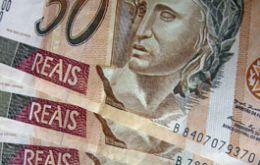
Brazil’s central bank changed currency market rules to curb bets that the Real will appreciate against the dollar, according to an e-mailed statement. Brazil will require that banks make non-interest bearing deposits with the central bank equivalent to 60% of their short dollar positions exceeding 1 billion US dollars, the bank said.
-
Wednesday, July 6th 2011 - 15:56 UTC
Brazil planning new intervention measures to curb its currency appreciation
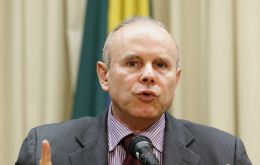
Brazil's government may intervene in futures markets to weaken the Real, Finance Minister Guido Mantega told reporters in London on the sidelines of a conference on Tuesday.
-
Wednesday, July 6th 2011 - 15:35 UTC
Brazil 2010/11 soy crop larger than estimated but strong Real eats into profits

Brazil's 2010-11 soy crop was larger than previously estimated, as higher productivity and a greater area of land planted with the oilseed resulted in record output, agricultural consultancy Celeres reported this week.
-
Tuesday, May 31st 2011 - 07:47 UTC
Brazil plans massive infrastructure investment in next four years
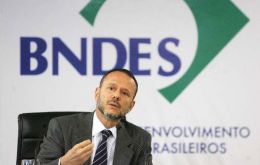
Brazil’ president of the Economic and Development Bank, BNDES, Luciano Coutinho said that the country’s investment rate in the coming four years will be equivalent to 23% of GDP, sufficient to ensure a sustained robust long term growth of Latin America’s largest economy.
-
Sunday, May 22nd 2011 - 23:06 UTC
Brazil’s Real will depreciate when the US and Europe raise interest rates
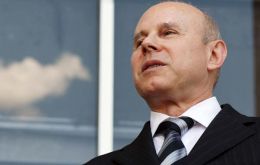
Dollar inflows into Brazil are returning to normal levels, and the Brazilian Real will start to depreciate once interest rates in the US and Europe start to rise, said Brazil Finance Minister Guido Mantega. He also anticipated tax reforms to boost Brazilian competitiveness.
-
Tuesday, May 3rd 2011 - 17:24 UTC
US printing press is flooding the world with dollars, claims Mantega

Testifying before Congress Brazilian Finance Minister Guido Mantega said that international commodity prices are behind much of the country’s rising inflation, but insisted the government will take action to keep prices in check and prevent the currency from strengthening too far too fast.
-
Friday, April 29th 2011 - 05:40 UTC
Brazilian exporters demanding a “weaker” Real to regain competitive edge

The strength of the Brazilian Real against the US dollar is “very worrying” for the country's exporters, with many companies struggling with higher production costs and a reduced ability to compete in global markets, Bunge Brasil CEO Pedro Parente said Thursday.
-
Thursday, April 28th 2011 - 06:39 UTC
Brazil’s bank lending slows down as government curbs credit
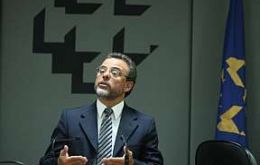
Brazil’s bank lending expanded in March at the second-slowest pace in 13 months as the government stepped up efforts to contain demand and inflation by curbing credit to consumers.
